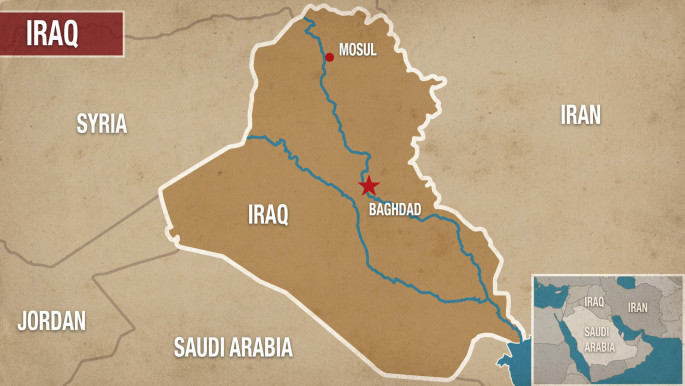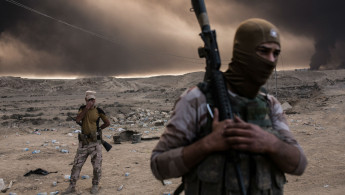#MosulOps: IS defences getting increasingly 'desperate' says US general
IS defences in Mosul are becoming increasingly desperate as the group uses less sophisticated hardware against Iraqi troops who are making slow, but steady, day-by-day advances.
3 min read
Iraqi troops are making slow but determined efforts into IS-held Mosul [AFP]
Signs are emerging that Islamic State group defences in Mosul are seriously waning following a three-month assault on the city by Iraqi forces, a US general has said.
Increasingly desperate tactics are now being taken by IS commanders in their fight to keep hold of Mosul.
US Army Major General Joseph Martin believes this shows the group is beginning to lack the vital military resources to defend the city.
"They've got a finite amount of resource that are on the eastern side and the fact that their capability is waning indicates that those resources are starting to dwindle," Martin told Reuters news agency.
"I see the commanders' reporting coming in and I see the exquisiteness of their SVBIED (suicide vehicle borne improvised explosive device) system. The sophistication of their SVBIEDs continuing to get lower and lower," he added, referring to the tactic used by IS of driving rudimentary armoured vehicles, packed with explosives, into Iraqi forces.
"The boom of the different IEDs [improvised explosive devices] is continuing to have a lower yield - all tell me that the enemy's capacity is diminishing over time. We see that as a positive indicator."
Phase two
Martin's comments come as Iraqi forces launched phase two of their operation to take the IS stronghold, having already captured around 60 percent of eastern Mosul.
US strikes have been critical, and Washington believes its anti-IS air coalition has killed 50,000 IS fighters, yet there have been huge costs on the ground for Iraqi forces.
Despite initial successes when October's offensive on Mosul city began, the Iraqi advance soon slowed as IS militants fought back with snipers, roadside bombs, improvised rockets and suicide bombers.
Although US and Iraqi intelligence are noting positive signs that the IS' improvised weapons are becoming less sophisticated, the group could have hardware stockpiled elsewhere.
"They've had two years to prepare for this defence and so I don't know how much stuff they have stored inside mosques, inside of schools, inside of hospitals," Martin said.
Desperate
Other analysts have also said that an increase in IS' attacks abroad and bombings in Iraq indicate the group's military force could be seriously weakened.
"As they lose capacity, they never cease to amaze me at the level they will take their despicability. They have done some things during the course of this campaign that I thought, 'It surely can't get any worse than that'."
Iraq's Haider al-Abadi has predicted that the Battle of Mosul will end in months, and IS will be driven out of the country by April.
Yet, there are reports of Iraqi forces suffering massive casualties, particularly in the ranks of the country's elite counter-terrorism unit.
That leaves Baghdad with Iraqi troops and Shia militias, the latter excluded from the fighting due to fear of reprisals.
Martin and other US commanders believe that due to this the battle could take longer, and that IS will continue with suicidal and nihilistic tactics to retain the city.
"There's in excess of 200,000 buildings [in Mosul]. Let's say that there's six rooms in each building... That's 1.2 million rooms that they've got to contend with and make sure that are clear," he said.
"That's 1.2 million rooms that they've got to discriminate between the enemy and the civilians that live there."
Agencies contributed to this story.
Increasingly desperate tactics are now being taken by IS commanders in their fight to keep hold of Mosul.
US Army Major General Joseph Martin believes this shows the group is beginning to lack the vital military resources to defend the city.
"They've got a finite amount of resource that are on the eastern side and the fact that their capability is waning indicates that those resources are starting to dwindle," Martin told Reuters news agency.
"I see the commanders' reporting coming in and I see the exquisiteness of their SVBIED (suicide vehicle borne improvised explosive device) system. The sophistication of their SVBIEDs continuing to get lower and lower," he added, referring to the tactic used by IS of driving rudimentary armoured vehicles, packed with explosives, into Iraqi forces.
"The boom of the different IEDs [improvised explosive devices] is continuing to have a lower yield - all tell me that the enemy's capacity is diminishing over time. We see that as a positive indicator."
Phase two
Martin's comments come as Iraqi forces launched phase two of their operation to take the IS stronghold, having already captured around 60 percent of eastern Mosul.
US strikes have been critical, and Washington believes its anti-IS air coalition has killed 50,000 IS fighters, yet there have been huge costs on the ground for Iraqi forces.
 |
Despite initial successes when October's offensive on Mosul city began, the Iraqi advance soon slowed as IS militants fought back with snipers, roadside bombs, improvised rockets and suicide bombers.
Although US and Iraqi intelligence are noting positive signs that the IS' improvised weapons are becoming less sophisticated, the group could have hardware stockpiled elsewhere.
"They've had two years to prepare for this defence and so I don't know how much stuff they have stored inside mosques, inside of schools, inside of hospitals," Martin said.
Desperate
Other analysts have also said that an increase in IS' attacks abroad and bombings in Iraq indicate the group's military force could be seriously weakened.
"As they lose capacity, they never cease to amaze me at the level they will take their despicability. They have done some things during the course of this campaign that I thought, 'It surely can't get any worse than that'."
Iraq's Haider al-Abadi has predicted that the Battle of Mosul will end in months, and IS will be driven out of the country by April.
Yet, there are reports of Iraqi forces suffering massive casualties, particularly in the ranks of the country's elite counter-terrorism unit.
That leaves Baghdad with Iraqi troops and Shia militias, the latter excluded from the fighting due to fear of reprisals.
Martin and other US commanders believe that due to this the battle could take longer, and that IS will continue with suicidal and nihilistic tactics to retain the city.
"There's in excess of 200,000 buildings [in Mosul]. Let's say that there's six rooms in each building... That's 1.2 million rooms that they've got to contend with and make sure that are clear," he said.
"That's 1.2 million rooms that they've got to discriminate between the enemy and the civilians that live there."
Agencies contributed to this story.





 Follow the Middle East's top stories in English at The New Arab on Google News
Follow the Middle East's top stories in English at The New Arab on Google News
![The UAE is widely suspected of arming the RSF militia [Getty]](/sites/default/files/styles/image_330x185/public/2024-11/GettyImages-472529908.jpg?h=69f2b9d0&itok=Yauw3YTG)
![Netanyahu furiously denounced the ICC [Getty]](/sites/default/files/styles/image_330x185/public/2024-11/GettyImages-2169352575.jpg?h=199d8c1f&itok=-vRiruf5)
![Both Hamas and the Palestinian Authority welcomed the ICC arrest warrants [Getty]](/sites/default/files/styles/image_330x185/public/2024-11/GettyImages-2178351173.jpg?h=199d8c1f&itok=TV858iVg)